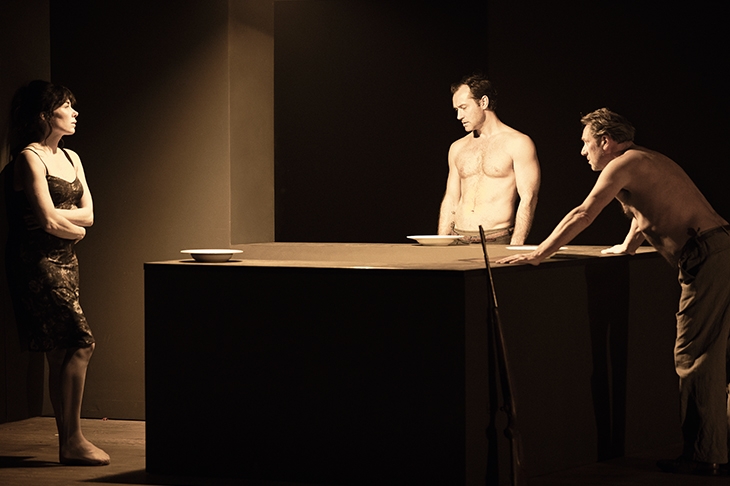Obsession at the Barbican has a complicated provenance. The experimental Belgian director Ivo van Hove adapted the show from a Visconti film based on the novel The Postman Always Rings Twice. This version originated in Amsterdam and was rendered into English by a London playwright. The story mixes surrealism with torrid carnality. Sexy Hannah is married to nasty Joseph, who runs a failing hotel. Hunky Gino (Jude Law) seduces Hannah. Let’s elope, he suggests. No, says Hannah. Gino hangs around the hotel mending a truck engine parked by Joseph in the foyer. Gino gets the engine working and it soars upwards and hovers 30 feet in the air. But even with a miraculous levitating engine to attract the punters, the hotel remains empty. Gino runs away and meets gay Johnny, whose hobby is impersonating Edith Piaf. Having spurned gay Johnny’s advances, Gino bumps into Hannah and Joseph who are heading for a talent contest. Joseph has remembered that he’s not just a failed hotelier, he’s one of Europe’s leading tenors. His big aria wins the competition. They celebrate with a booze-up which turns into a wrestling match and a sort of groping session beneath the hotel’s prize exhibit, the hovering engine, which unexpectedly disgorges a hundredweight of black treacle on to the squirming threesome. Joseph dies of a treacle overdose.
Later it emerges that this oily tableau alludes to a traffic accident. The plot then curdles into a life-insurance payout mystery. It’s weird, visually scruffy, narratively misshapen and perfectly unengaging. Gino, bored with Hannah, turns to drink and scowling. They indulge in tantric sex sessions, fully clothed, but these are less erotic than they might have been because we’ve just seen them stark naked having a bath in a dustbin. Johnny shows up at reception and Gino punches him so hard that he falls into a pile of litter. Gino then drags Johnny by the left leg clockwise through the litter. He then changes leg and drags him anti-clockwise through the litter. This demonstrates that the director is alive to the possibilities of contrapuntalism.
The story finishes at the seaside, which is conveyed to those viewers still troubled by consciousness with a film clip of wavelets projected on to the back wall. Gino stands in silhouette beside the foaming shoreline, alone, proud, defiant, and, basically, a bit of a git. And this is the problem. Without any social context, without any sense of place or time, the focus is restricted to the inner lives of the characters, who are all simpering windbags and self-pitying egoists besotted by lust and misanthropy, and unaffected by brains or imagination.
The clunkingly alliterative dialogue —drawn from the Sid James era — is either sententious or banal. ‘A provident man cares for his kin,’ says Joseph. ‘There’s more in this merry world than the lure of the ladies,’ offers gay Johnny. ‘Don’t worry your pretty head over someone like me,’ implores Gino. ‘You’re a cheeky little thing, aren’t you?’ he says to a stray chorus girl whom he fitfully penetrates while breaking up with Hannah. At least the production knows what the audience is after. Jude Law keeps whipping off his top so that his muscles can be sketched by anatomy students in the upper circle.
As entertainment, Obsession is worthless. As an album of platitudes-to-avoid-at-all-costs it’s priceless. My top five: strewn garbage to represent ‘turmoil’. The man-on-man punch-up that turns into a soppy gay hug. Characters jogging on the spot to suggest ‘escape’. Windswept beaches to indicate ‘desolation’. A hissy fit that ends when a character kicks a litter bin 30 yards across the stage like Suárez slotting one in from outside the box. The play’s final beat is a hideous crime that effortlessly quadruples the nastiness of everything that went before. And after that came an awkward silence. The dialogue seemed to have petered out and the actors lined up meekly at the front of the stage. And still nothing. Embarrassing! Eventually someone clapped and the rest of the crowd joined in out of sympathy. As the actors trooped away, they exchanged heigh-ho glances like security guards coming off shift after a long night staring at actionless screens. I know the feeling.
There’s just space to recommend Lyndsey Turner’s superb revival of Martin Crimp’s 1993 satire The Treatment at the Almeida. A woman selling a screenplay gets caught up in a complicated sex game orchestrated by a rapacious producer and a voyeuristic elderly writer. The play ruthlessly dissects the vapid, self-adoring milieu of New York and its media darlings. Giles Cadle’s design is a triumph of subtle elegance and Turner uses her huge cast to create an impressive air of naturalism. The script is full of comic flourishes and memorable characters like the philistine, Simon, who sneers at a production of Othello in Central Park. ‘I hate Shakespeare in the Park. It pollutes the Park.’







Comments